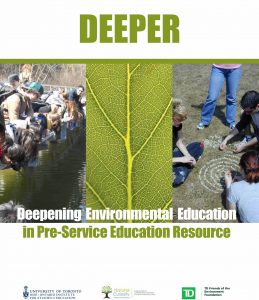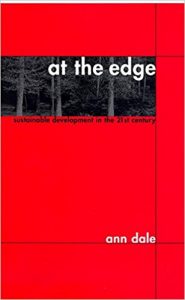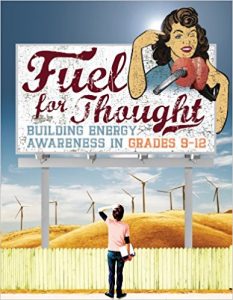In celebration of OISE’s Annual Eco-Fair on January 27, 2018, the OISE Library is highlighting its books and resources on environmental and sustainability education for the month of January. The display features a variety of materials from the library’s stacks, children’s literature, and curriculum resources. These materials are geared towards helping students and teachers understand the importance of infusing environmental awareness within all forms of education. Please check out these titles in the lobby book display, located on the ground floor of the OISE building.
Deepening environmental education in pre-service education resource, by Hilary Inwood and Susan Jagger

OISE instructor Dr. Hilary Inwood and Ryerson professor Susan Jagger created Deepening environmental education in pre-service education resource as part of the faculty’s DEEPER project, which introduces teacher candidates across Ontario schools to basic environmental education principals. Written as a teachers guide, the book provides readers with practical approaches towards environmental education by utilizing case studies, teaching strategies, and recommended resources on the topic. The purpose of the book is to increase awareness of environmental education among staff, students, and faculties, and to provide teacher candidates with valuable insights into the importance of infusing environmental education within school curriculum.
Environmental education in context: An international perspective on the development of environmental education, by Neil Taylor, Michael Littledyke, Chris Eames and Richard K. Coll (Eds.)
Environmental education in context: An international perspective on the development of environmental education examines how the social, political, and cultural factors of a country or region influences its field of both formal and informal environmental education. The book features a variety of case studies and works by experts and professionals from 25 different non-English speaking countries. The local insights and knowledge presented in the book allow readers to gain a greater understanding of how different cultural contexts promote or hinder the effectiveness of environmental education. The book covers topics such as the implementation of environmental education, role of institutions, external influences, and many more.
Fuel for thought: Building energy awareness in grades 9-12, edited by Steve Metz
Fuel for thought: Building awareness in grades 9-12 is a comprehensive teachers guide geared towards helping high school students become familiar with fundamental concepts of energy and environmental awareness. The teachers guide is divided three main sections –each section is comprised of a particular set of tools or resources for students to engage with. The first section consists of a variety of classroom and field activities that help students to learn the science behind energy. The second section includes a series of case studies and projects that promote critical thinking. Lastly, the third section of the guide provides in-depth knowledge into the greater significance of sustainability, which compels students to tackle the issues of energy and the environment in a sociopolitical context.
Wild eggs: A tale of Arctic egg collecting, by Suzie Napayok-Short and illustrated by Jonathan Wright
 Written by Suzie Napyok-Short and illustrated by Jonathan Wright, Wild eggs: A tale of Arctic egg collecting, is a heartwarming story about a young girl named Akuluk and her adventures while visiting her grandparents in Nunavut. Initially unhappy about the trip, Akuluk quickly begins to change her outlook as she discovers the natural wonders around her. Akuluk embarks on egg-hunting adventures with her grandparents and learns about the animals that inhabit the various natural landscapes of Nunavut, as well as the family’s traditional ways of hunting and gathering wild eggs.
Written by Suzie Napyok-Short and illustrated by Jonathan Wright, Wild eggs: A tale of Arctic egg collecting, is a heartwarming story about a young girl named Akuluk and her adventures while visiting her grandparents in Nunavut. Initially unhappy about the trip, Akuluk quickly begins to change her outlook as she discovers the natural wonders around her. Akuluk embarks on egg-hunting adventures with her grandparents and learns about the animals that inhabit the various natural landscapes of Nunavut, as well as the family’s traditional ways of hunting and gathering wild eggs.
At the edge: Sustainable development in the 21st century, by Ann Dale
 Ann Dale’s At the Edge: Sustainable development in the 21st century paints a grim picture for humanity as she exposes the negative social and economic impacts that have been brought on by rapid ecological deterioration. Dale argues that sustainable development is key to remedying the world’s disastrous ecological status. However, the movement towards sustainability is not solely comprised of advancing green technologies, instead it can only be achieved through the development of ecological, social, and economic imperatives. Looking at existing literature, research, and current Canadian policy on sustainability, Dale discusses how strong government leadership is necessary to promote sustainable development within all areas of society.
Ann Dale’s At the Edge: Sustainable development in the 21st century paints a grim picture for humanity as she exposes the negative social and economic impacts that have been brought on by rapid ecological deterioration. Dale argues that sustainable development is key to remedying the world’s disastrous ecological status. However, the movement towards sustainability is not solely comprised of advancing green technologies, instead it can only be achieved through the development of ecological, social, and economic imperatives. Looking at existing literature, research, and current Canadian policy on sustainability, Dale discusses how strong government leadership is necessary to promote sustainable development within all areas of society.
For more titles on environmental and sustainability education, please visit the ground floor lobby display. All resources in the display case can be checked out – please ask a staff member at the circulation desk for assistance.


